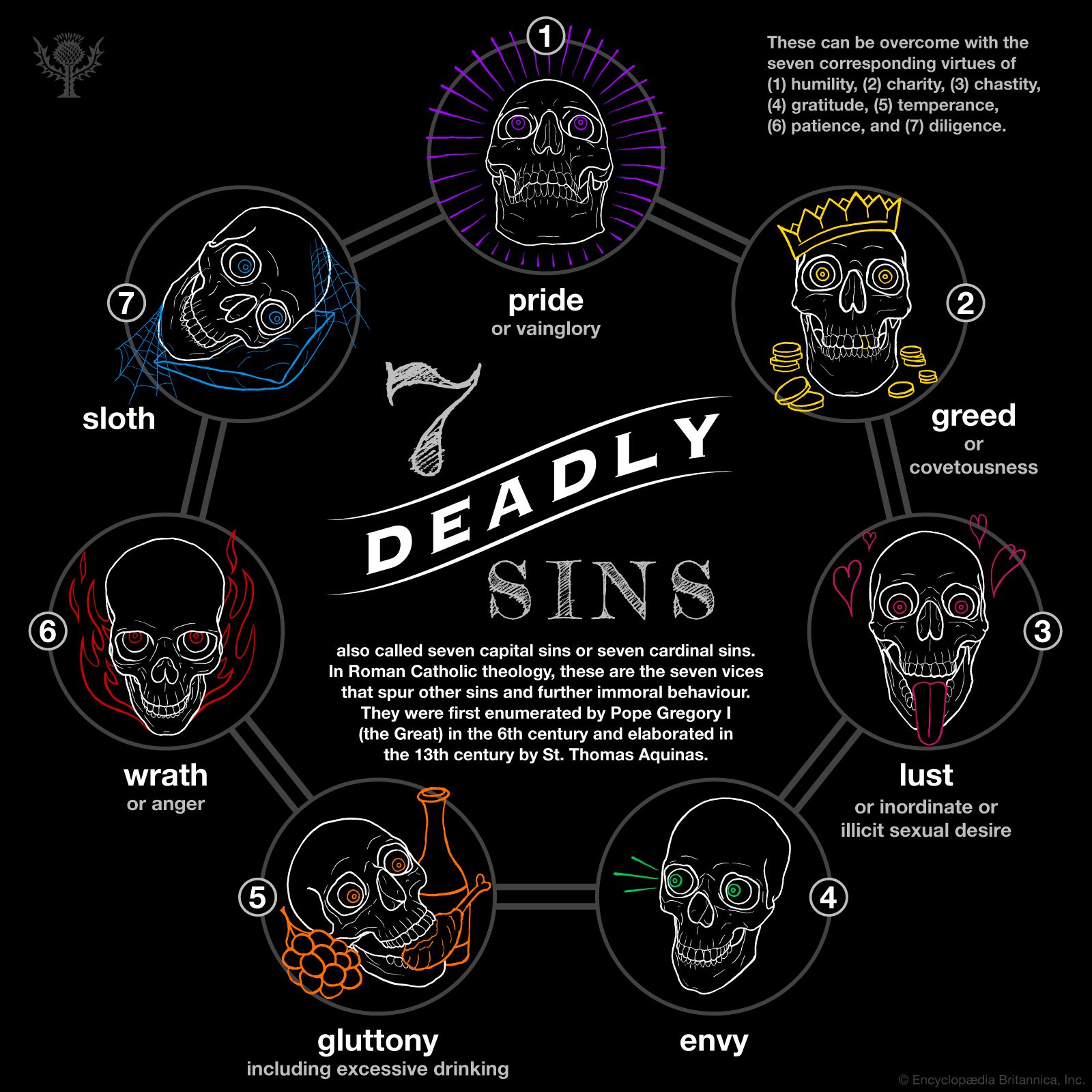How to Overcome the Seven Deadly Sins
How to avoid pride, greed, lust, envy, gluttony, wrath, and sloth.

The seven deadly sins are a list of vices that one should seek to avoid. The following describes each one and how to counteract it with a virtue.

Pride
Pride is the fear of being ignored. It often stems from thinking that what makes people acceptable is their accomplishments and material possessions. That is why prideful people often have the fanciest college degree, car, or house.
We can solve this by developing good friendships, romantic relationships, and social skills.
Greed
Greed is the fear of lack. The greedy hoard money and material objects. There is no amount of money that can satisfy them.
Greed is common in the US because we have a monetary system that allows for infaltion. The dollar is being inflated at 10-15% per year. This means, if we use the 15% estimate, you will lose half of your money in about 6 years. It's no wonder that people are insecure about their money – it is impossible for working-class people to get rich if they are losing half of their money every 6 years. The only way to solve this problem is to invest.
We need to get people to the point of satiation. Some people just need to make enough money that they feel fiancnially secure. Greedy people can even become charitable if they feel like they have enough to sustain themselves. To do this, we must develop our personal finance, business, and investing skills.
The probelm is that for some people, increasing their net worth only makes them want more. for those people, we need a different solution – stoicism.
The ultimate solution is Stoicism. These people need to learn that they could be ok living below their means. It is a cardinal rule of the stoics to live in a small house, wear cheap clothes, and eat only beans and rice every day. When people do this and develop a stoic mindset, they realize that they can survive and thrive with few possessions and little money. When you train yourself to be comfortable with having nothing, you will not fear having nothing.
Lust
Lust is the fear of being unaccepted. Seuxal intimacy with many partners gives us a false sense of acceptance and closeness.
The big problem with lust is that when our partners leave, we end up feeling even more unaccepted.
To solve this problem, we first need to analyze and develop ourselves. Then develop meaningful friendships. Then develop a fulfilling romantic relationship.
Envy
Envy is possibly the most common of the sins. Nobody envies Oprah. She's distant (none of us know Oprah personally) and she worked hard for her success. But we do envy the neighbor who just got the new Tesla Model S Plaid. Or our cousin who bought a multi-million dollar mansion. This is because we are closer to them. They taunt us with their success. Why couldn't it have been us? It should have been us.
Social media has exacerbated the problem. Seemingly everyone is rich and attactive now. But why not us?
Envy is the fear of not being as successful as we could have been.
There is only one way to fix this – develop habits that turn us into the successful person we want to be. But how? Develop health, knowledge, good relationships, and wealth. Also, develop confidence by maximizing power and minimizing risk.
Gluttony
Food and alcohol is always there.
Gluttony stems form not having emotional stability. We seek to replace love with food or drink.
How do we cultivate emotional stability? First, we have to work on the self – fix your health issues and start reading books.
Once we have worked on the self, we can develop good realtionships. First you must join a club or group, like volunteering or a book club to make friends. After you have a fulfilling friend group, you can start dating. it is essential to develop friendships first, because romantic relationships are more difficult than friendships (we don't learn calculus before algebra).
Wrath
Wrath is the fear of being scared or uncomfortable. When we are in an uncomfortable situation, like a disagreement, we can easily turn to anger because it is a somewhat acceptible mechanism to get us out of the situation.
You can often see this. When someone is scared, they will easily swtich to anger. For example, if someone is afraid of heights and you are at the It is a defense mechanism.
It's an acute victim mentality response. When people are scared, if someoen does soemthign to scare them, they feel hurt. That makes them the victim in the situation and gives them the moral 'right' to respond in anger (that's how the logic goes). When someone tries to take us outside of our comfort zone, we may respond with anger.
The clip from spiderman 1 shows this perfectly. Norman is fired from CEO of his company. He says "you can't do this to me" (victim mentality) and then yells at the board (the people who fired him). He later kills the board.
Sloth
Sloth is the fear of failing.
People who are self-sabotogers actually want attention. They often have the victim mentality. They especially have a fixed mindset – they don't believe that thier base abilites can be improved though hard work. This is why they fear failing – if they fail at soemthing, it means, in their mind, that they're a failure.
We live in a capitalist meritocracy, because of this we believe that the best people's at producing goods and services (entrepreneurs) are the best people. This also means that we think the people who are not good at those things are the losers. This means most of us tie our self worth to how good of an entrepreneur we are or how important our job title sounds. This leaves everyone to think that if they are ever seen being bad at something, it makes them a bad person or a loser. But that is far from the case--everyone is bad in the beginning of starting something new.
Procrastination is a derivative of this. We all procrastinate because we all have a bit of a perfecstionist in us. That perfectionism is actually insecurity – if our work isn't perfect, it means we're not good enough.
To get over this, we need to fail publicly and often. Start a blog or YouTube channel, your first (hundred) posts will probably be terrible. That's normal and you will improve over time. Everyone is a beginner when they start something new.



Comments ()